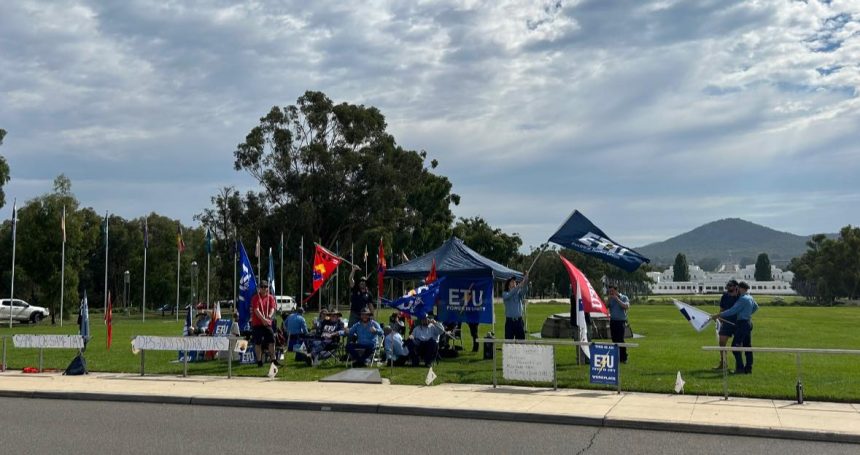Electricians and trades staff responsible for keeping lights on at Parliament House have walked off the job today in a protest for fair pay.
The Electrical Trades Union (ETU) has led the charge, setting up a picket line outside the national institution alongside members from other Australian Manufacturing Workers’ Union (AMWU) and the CFMEU.
According to ETU Secretary Allen Hicks, full-time sparkies working within the Department of Parliamentary Services (DPS) were paid about $30,000 below the industry’s average annual salary of $93,862.
“The workers who keep the lights on at Parliament House are being blocked out when it comes to fair wages,” Mr Hicks said.
“The department has continued to ignore our calls for fairer wages for trades staff working inside Parliament House, so we’ll make them loud and clear out the front.
“The department must do the decent thing and provide their permanent trades staff a better deal that delivers competitive wages.”
Today’s strike comes only days after AMWU members announced they would be undertaking protected industrial action at Parliament House.
“This action comes in response to senior management’s refusal to explore options during the bargaining process to rebuild the core capability of trade staff within Parliament House,” the union said in a statement.
“The DPS’ poor judgment and failure to pay staff competitive wages is at the expense of our members’ professional dignity.
According to both Mr Hicks and the AWMU, the refusal to lift wages has left many positions vacant within the department and has forced the government to fork out hundreds of thousands in taxpayer dollars to pay expensive outside contractors competitive premiums.
“Contractor staff, who are paid competitive industry rates, work alongside trade-qualified permanent staff who are compensated as little as APS level 3 equivalent,” an AWMU spokesperson said.
“This aggravates the disparity in remuneration between workers and recently formed business unit Electronic Security Services who are paid at APS level 5 and 6.”
Mr Hicks said worker morale had hit rock bottom, and workers were “fed up”.
“It’s a kick in the guts to have contractor staff who’re paid competitive industry rates working alongside trade-qualified permanent employees who’re earning the equivalent of a contractor apprentice,” he said.
“We have federal politicians acknowledging the need to fill the chronic shortage of electrical workers, yet one of their own departments is offering their trades staff a dud deal that does nothing to retain and attract the workforce.”




